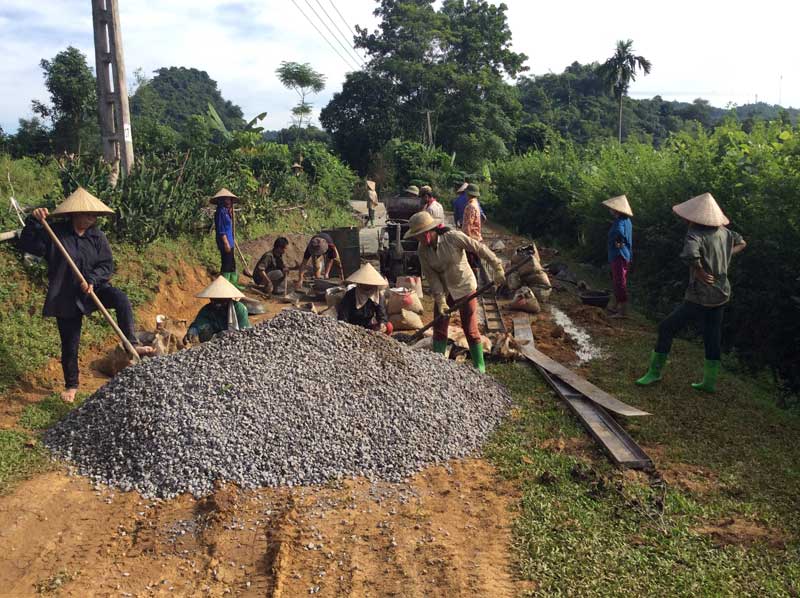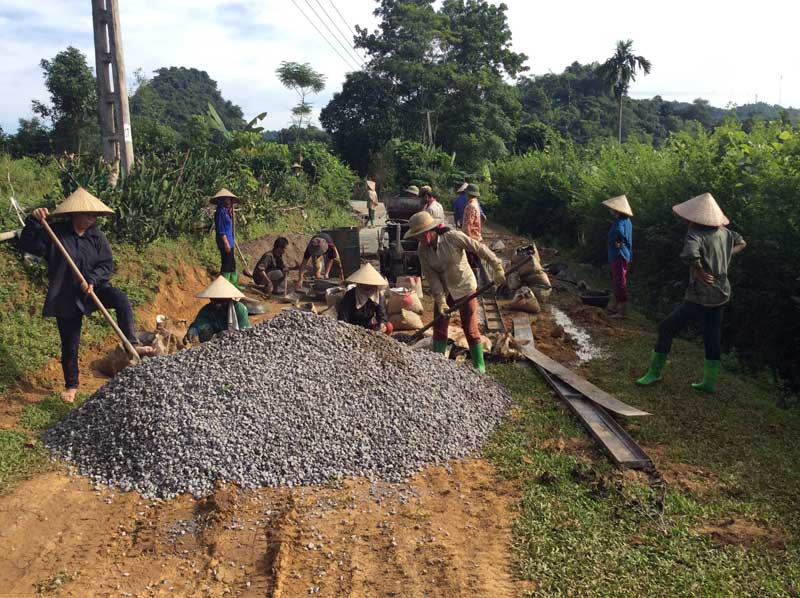
(HBO) – Preserving traditional cultural values has formed the basic foundation for Dich Giao commune, a locality inhabited by Muong ethnic people and located in the centre of Muong Bi region, to successfully develop a standout new style rural area model in Tan Lac district.
Dich Giao commune was recognised as a new style rural area in June 2015. Local
Party, authorities and people have continued their efforts to mobilise social
resources to improve its realised criteria. The commune has upgraded and
expanded many rural roads in accordance with set criteria. Roads running
through Khang, Sung 2 and Sung 3 hamlets were enlarged to 3.5 metres in width.

Photo:
Locals in Khang hamlet, Dich Giao commune involve in road construction
The commune has paid due attention to ensuring rural environment. Along
with signing commitments with the authorities to protect the environment in
production and breeding, local people have maintained road clean-ups to ensure
public health. Responsibilities of local individuals are concretised in each
hamlet’s regulations. Accordingly, local residents voluntarily clean up rural
roads in every Saturday.
Bui Van Dinh, Chairman of the Dich Giao commune People’s Committee, said: "The
commune’s success in implementing the national programme on building new style
rural areas is spurred by the consensus of local officials and Party members
who have set good examples and played pioneering roles in the mission”.
Notably, Dich Giao has prioritised the preservation of traditional cultural
values. Despite the changing life, it is still common to see traditional
costumes to be worn by local people or hear stories and greetings in ethnic
languages. It becomes the ideology of local people in the new style area
building process.
During the construction of rural infrastructure, more than 700 households
donated their lands. Among families giving hundreds of metres of land are Bui
Van Hau’s family in La hamlet and Bui Thi Thoan’s family in Sung 1 hamlet.
Currently, 11 out of 14 hamlets in the commune are cultural villages and more
than 85 percent of households are recognised as cultural families./.
The emulation movement "Hoa Binh joining hands to build new-style rural areas” has been widely spreading, becoming a driving force that motivates the localities to renew rural landscapes and improve the material and spiritual lives of the residents. In this movement, the people play a central role-both as the main implementers and direct beneficiaries of its outcomes.
In response to the global digital revolution, Hoa Binh Newspaper is transforming itself into a modern and multi-platform media hub, blending cutting-edge technology with a restructured newsroom and a new generation of tech-savvy journalists.
Hoa Binh province’s Association of the Elderly recently held a conference to review the project on expanding the inter-generation self-help club model until 2025.
In a move to implement Resolution No. 57-NQ/TW, issued on December 22, 2024 by the Politburo, which targets breakthroughs in science-technology development, innovation, and digital transformation, the Hoa Binh provincial Department of Health has issued a plan to roll out the "Digital Literacy for All” campaign within the local health sector.
An Nghia Commune (Lạc Sơn District) is one of the communes that achieved the tha standard of the national new rural area in 2018. Entering a new development phase, the commune is now trying to meet the criteria for the advanced new rural development. With the strong political will and the public consensus, the commune is gradually overcoming the challenges to reach this goal, aiming for the sustainable development.



